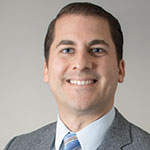Lung Cancer Screening: Who’s In and Who’s Out? A Pro-Con Debate (B10)
9:15-11:15 a.m.
Monday
Room 32 A-B (Upper Level), San Diego Convention Center
Lung cancer screening works. But screening isn’t an unallied benefit for everyone being screened. As ever-larger patient populations undergo screening, it is becoming clear that some patients are better off not being screened. The question is who.
“One eye-opener is how unclear some of the guidelines are in terms of recommendations for certain patient populations that might have higher potential risks related to screening than potential benefits,” says Jonathan M. Iaccarino, MD, MSc, assistant professor of medicine at Boston University Medical Campus. “We are still learning how to tease out which patients will benefit from screening as opposed to those who will experience harm or might be at higher risk for harm than others.”
Dr. Iaccarino is the lead chair for a translational symposium on Lung Cancer Screening: Who’s In and Who’s Out? A Pro/Con Debate. Why set up a debate when the data are less than conclusive?
“This is how, clinically, these issues are being thought about,” Dr. Iaccarino says. “The pro-con format is a natural conversation that reflects how clinicians face these issues with real patients in the real world. Some clinicians are really in favor of screening certain patient populations because there really is benefit. And some clinicians are against screening those same patients because there is potential risk. We all have to make that judgment.”
Lung cancer survival has not changed significantly in a generation, Dr. Iaccarino says. That was one reason the National Lung Cancer Screening trial created such a stir when it showed a 20 percent reduction in lung cancer mortality for individuals screened using low-dose computed tomography and a 6.7 percent all-cause survival advantage for low-dose CT versus single-view posteroanterior chest radiography.
“Whenever you have a finding like that, there is always a push to start implementing it in as many patients as possible,” Dr. Iaccarino says. “There is going to be some over-screening. This is a natural result when you introduce any new screening program. It takes time to learn where you need to step back in order to ensure that you aren’t doing more harm than good.”
The screening procedure itself is relatively low risk, but the lung biopsies and other procedures that can follow a positive finding are anything but trivial.
There are some populations—for instance, long-term smokers with no other health concerns–who can clearly benefit from screening. These patients are at highest risk for lung cancer and at the lowest risk for complications from screening.
How about long-term smokers with other comorbidities such as COPD or severe heart failure? They could well benefit from screening, but the severity of their comorbidities puts them at much higher risk for complications from a lung biopsy or other follow-ups to screening.
What about patients with the most severe comorbidities? At which point does reduced life expectancy from COPD or cardiovascular disease compare to life expectancy from any lung cancer that might be detected on screening? At what point does it make more sense to not screen for lung cancer?
There are similar questions at the other end of the spectrum. Smokers with a shorter history of smoking are likely to be younger, healthier, and less likely to be harmed by a lung biopsy. They may also be at lower risk for lung cancer. Screening these patients may not be cost effective or particularly beneficial.
“The one thing that is clear is that we can’t just screen without considering risks and benefits,” Dr. Iaccarino says. “We are subjecting millions of new patients to screening while we don’t fully understand the implications. Lung cancer screening has the real potential to save lives and the significant potential to do harm. This is a conversation that we should be having with all patients we are considering for lung cancer screening.”

